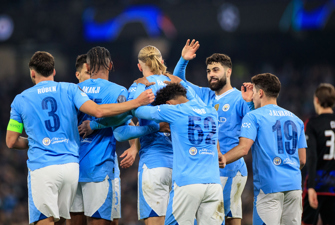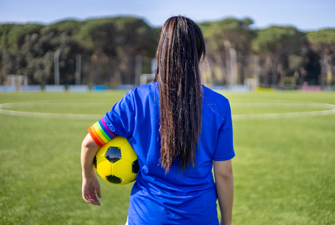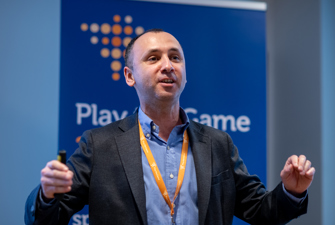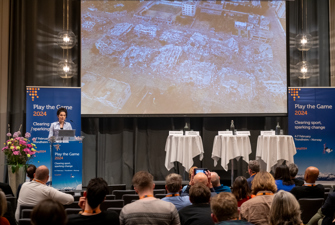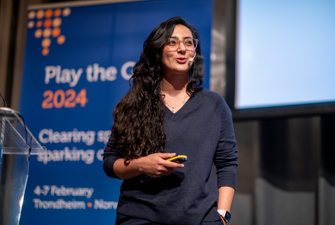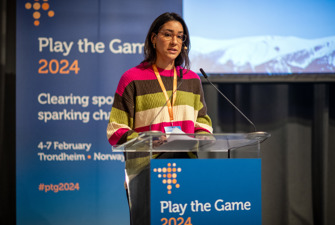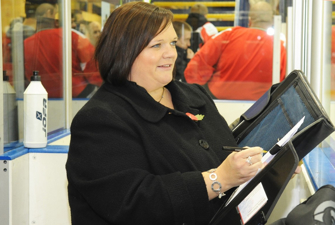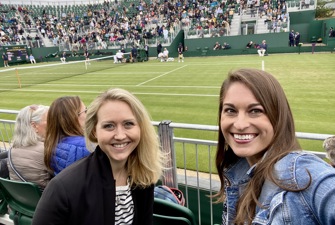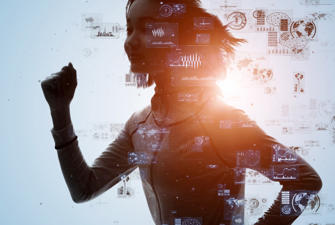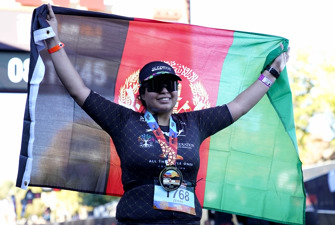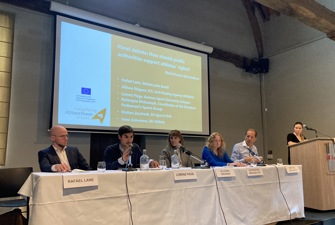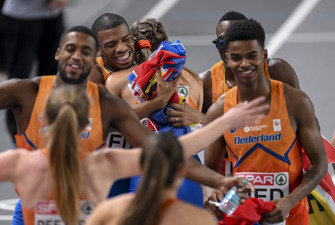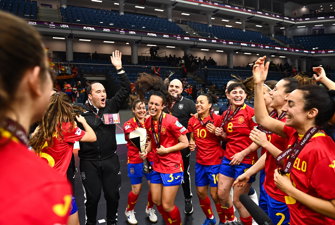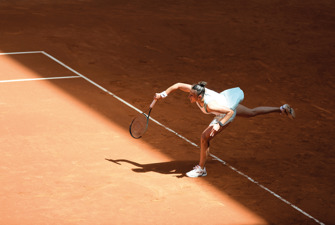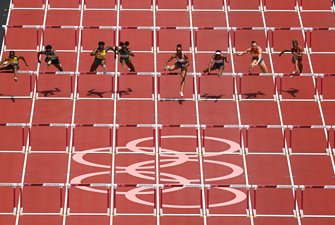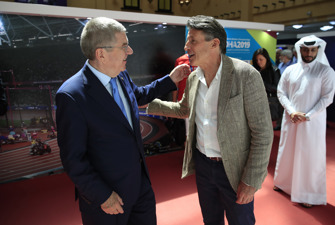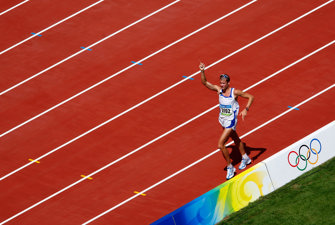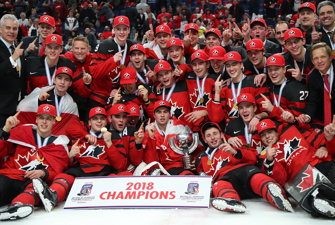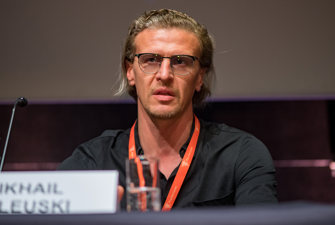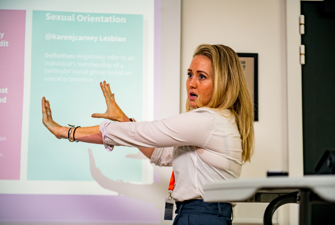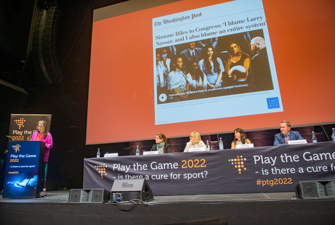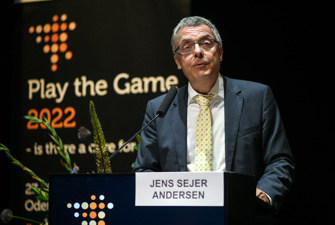Athlete activism is getting a female face
A new generation of women are speaking up for their rights in sport. While older generations of female athletes mostly fought for equality in the structures, contemporary athletes have a broader perspective.
“I was born in the former Soviet Union where you couldn’t speak freely about what was on your mind, and everyone had to be the same. I grew up in a small town where you had to stand in line for milk and bread. Never did I think that basketball would help me to get to a point in my life where I can express my opinion, where I matter and can be heard.”
The Olympian basketball player Yelena Leuchanka has become one the latest examples of athlete activism with a female face. At the end of September 2020, the former WNBA star and member of the national team in Belarus was sentenced to 15 days in prison for taking part in peaceful demonstrations against President Aleksander Lukashenko – the ruler of Belarus for more than 26 years and widely labelled as ‘Europe’s last dictator’.
Since her arrest, Yelena Leuchanka has become a role model for thousands of protesting people in her country who for months have been beaten and jailed by Lukashenko’s riot police.
It can be argued that the current wave of athlete activism set off four years ago, when American football star Colin Kaepernick from San Francisco 49ers introduced his famous protest against police brutality and racial inequality in the US by kneeling during the national anthem at NFL games.
Since then, Kaepernick’s silent protest has been adopted by elite athletes across sports and national borders who now take a knee to express sympathy with the anti-racist cause.
But athlete activism has widened. It is no longer targeting racism only, and athlete activism is no longer having a masculine face only. The wind of change increasingly comes with a female face.
A new generation of women has taken up the fight for their rights and for social justice at all levels in sport and has the potential of changing the male dominated management of sport in an even more fundamental way than athletes taking a knee.
High profile athletes like Beckie Scott, Megan Rapinoe, Venus Williams, Gwen Berry, Caster Semenya, Yuliya Stepanova, Khalida Popal, Rachel Denhollander, Kara Goucher, Ada Hegerberg, Pernille Harder, Aleksandra Herasimenia, Yelena Leuchanka, and Aleksandra Shelton, all have become international role models thanks to their public protests over the management of sport.
By speaking up about harassment of athletes, equal pay, freedom of speech, gender politics, sexual abuse, doping, democracy, transparency, and a lot of other issues, the female voices echo what older generations of female athletes fought for decades ago with limited success.
A clear tendency
“In 1980, we were a number of women who put focus on equality in sport. Our focus was primarily on the structure and the top management of sport. But since then there has been only little change in these areas,” says Else Trangbæk, the first female gymnast to represent Denmark at the Olympic Games.
Trangbæk competed at the Olympic Games in Mexico City where one of the first and most iconic examples of athlete activism took place as American athletic medalists John Carlos and Tommie Smith raised a black-gloved fist - a symbol of the Black Power movement - at the medal podium.
52 years later, the professor emerita at the Department of Exercise and Sports Science at the University of Copenhagen and European winner of the 2020 IOC Women and Sport Award for her life-long advocacy of gender equality in sport points at the huge amount of money in modern elite sport as a key factor in the way the new generation of women in sport focus on equality.
“The arrival of money in elite sport has resulted in some changes, even though there is less money in women’s sport. Women raise new questions. Professional women in sport have new demands. And the role of the media has changed fundamentally too and can help focus attention on the significant women’s problems,” Trangbæk says.
“Earlier, there was a relatively narrow focus on equality in sport. Today, women in sport focus on many different issues that are related directly to their sports. To me, this is a clear tendency.”
A challenge to the IOC
In Belarus, Yelena Leuchanka is not only a national role model. She is also a challenge to the world’s leading sports organisation, the International Olympic Committee (IOC), to whom the athlete-lead Belarusian Sport Solidarity Foundation have turned to for help in their fight for the human right to express political opinions.
The Belarusian athletes want the IOC to act on the fact that protesting athletes are kicked out of their clubs and the national teams for political reasons by loyal supporters of Lukashenko, who for 23 years has been accepted by the IOC as head of the national Olympic Committee (NOC) in Belarus.
“Earlier this year when an Iranian wrestler was executed, the IOC did not react until after his death. Maybe it is about time for the IOC to get involved now. At the end of the day, without the athletes there would be no Olympics, there would be no sport,” Leuchanka tells Play the Game.
“Isn’t it what the IOC is all about, to care for the athletes? Isn’t it what the rules of the Olympic Charter are about? Isn’t it what the IOC stands for? We have asked the IOC for help because our NOC does not fight for us. So who else can we turn to than the IOC? We are like kids turning to their mother for protection.”
So far, the mother has not come to rescue her children. In early October, the IOC promised to investigate the situation in Belarusian sport further, but since then there has been silence.
Another view of athletes
On a personal level, Yelena Leuchanka is inspired by protesting athletes in both the US and Europe. To her, the athletes are now being respected for standing up for what they believe in instead of just being ignored:
“The difference for me is that in the US and other democratic countries people can go out and protest and say what is on their minds. In Belarus, it is a totally different thing. Belarus is not a democracy. We are at a different level, we are North Korea,” she says.
Leuchanka now feels very honored by the Belarusian people who think of her as a role model for the protest movement in her country and not just as an athlete. And she has no doubt that the present athlete activism in Belarus and other countries are changing athletes’ position in both sport and society in general:
“We are changing the way athletes are viewed all over the world. Many people believe we only care about dribbling a ball. But I think many more athletes in the future will stand up for what they believe is right and use their platform in sport to fight for the good of the people.”
Many factors in play
This trend of female athletes using their platform not just to fight for equality in sport but also to improve society in general is noted by Paulina Tomczyk, a former member of Poland’s national judo team and today General Secretary of EU Athletes, the European federation of player unions and athlete associations.
“For the past five years I have seen a change in the creation of organisations that represent women athletes and in the number of women asking for more equality and speaking out about their rights,” Tomczyk notes, believing there are many factors at play.
“It can be quite challenging for a woman even to access sport and be a woman at the same time. Doing professional sport as a woman can be seen by the public as entering a domain that is not really for women. Their performances can be neglected, and they can hear negative, and to be frank, disgusting comments about their bodies and stuff like that,” she explains.
“Standing up to something like that and fighting for your own personal justice may empower you strongly to think that maybe you should also do something for the society at large. And I think that since sport is an important part of society there are parallel trends that goes hand in hand. The Caster Semenya case happened at the same time as discussions increased in society about "non-normal" people and everything that is related to that. One provokes the other. Generally, it is the same with issues like gender equality and pregnancy, really personal stuff that women have to fight for and then can bring forward in more general discussions in society.”
A new phenomenon
Paulina Tomczyk also observes that the general trend of athletes being concerned with society probably is related to the increasing popularity of social media.
“The coverage of female athletes in traditional media is much less than the coverage of male athletes. And the reporting on women in sport often follows who they are married to or what kind of outfit they prefer,” she said.
According to Tomczyk, that is why many female athletes now use social media where people are free to follow female athletes for whatever reasons and athletes are free to create their own content.
“Some of the most followed athletes on social media are female. It is easy to use social media as an important tool to bring awareness to your case. Back in the old days, athletes mainly had the opportunity to protest at games, on the podium, or in media interviews. Now, they have an opportunity to reach millions of their followers, and I think they use it in a good way,” she said while mentioning the Belarusian case as an example.
“It’s a really special case. Athletes and other people related to sport have in a way become the leaders, or at least the moral leaders, of the people’s movement. This confirms the important role sport has in society. Athletes in general are role models we want to look up to. But for quite some time we have had this philosophy of telling athletes to ‘shut up and play’. Now, we are beginning to see them as leaders in this area too. This is a new phenomenon and we still see resistance from the sport governing bodies,” Tomczyk says and points to Rule 50 of the Olympic Charter as an example of limitations to the freedom of expression of athletes.
‘A nice young lady’
To Tomczyk, sports organisations in general expect athletes to be role models but only if what they say is not too controversial or make the people in power uncomfortable.
“If athletes are speaking out against a sports organisation or a country, very often they are met with repression and attempts to silence them. This is still very visible. But hopefully the trend of athlete activism will make it less frequent,” she says.
“For many years, the approach of sports organisations to women’s sport was like ‘you are lucky to be allowed to play here and you are lucky that we are giving you the t-shirts for free’. Now, women have become much more aware of the fact that they have certain rights. But generally, there is still so much to be done regarding equality for women in sport at all levels.”
As an example of her own, Tomczyk mentions that in her work for EU Athletes she is often the only woman on a panel full of grey-haired men and that she has had a personal experience with an old IOC-member addressing her in a ministerial conference as ‘a nice young lady’:
“I think this is the way men addresses women if they don’t like what women are saying. Especially at the highest level. The highest positions in sport are still dominated by men. I think some people in the older generation still feel uncomfortable if someone tries to challenge what they are saying, and that it is even worse for them if it’s a young woman.”
A team effort
In North America, Olympic Swimmer and Human Rights Lawyer Nikki Dryden sees a difference in athlete activism that is caused by the way male and female athletes are organised:
“While athlete activism on the men’s side comes mostly from professional male athletes who have the support of unions behind them, for Olympic female athletes to stand up, they do it without any union support,” the Canadian said.
“This means they need sport administrators and even coaches behind them who support what they are doing and empower them to speak out. The rise of female athlete voices corresponds somewhat to the rise of the increased involvement and promotion of female athletes on boards and other women in administration positions. The rise of women involved off the field and in coaching has naturally created space for female athletes’ issues to be reviewed and raised.”
As an example, Dryden mentions Chelsea Football tailoring training to their athletes’ menstrual cycles:
“This provides female athletes with more professional training and elite sport - and create space for women to talk about issues that matter to them,” she says.
The Canadian also notes, that whether it is Venus Williams’ op-ed in the London Times demanding equal pay at Wimbledon, or Ada Hegerberg boycotting the World Cup for the same reason, these higher profile professional women athletes have played a critical role in paving the way for other female athletes to speak up:
“The rise of the female athlete voice truly is a team effort. From women coaches and administrators to top female athletes and the human rights activists working off the field to support them, there is no stopping us now,” Dryden says.
The female face of athlete activism certainly is more visible than ever before. But the answer to where it will lead to for women in sport is still blowing in the wind of change.
Lars Jørgensen is a freelance journalist specialised in international sports politics.








